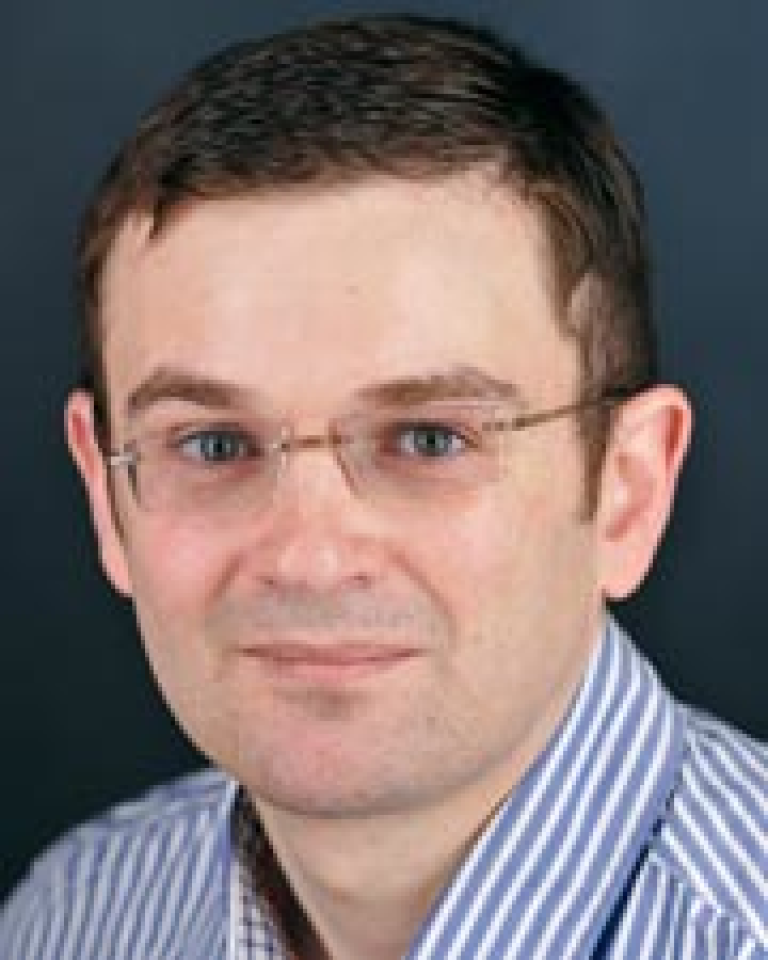Michael Rubin

MENTOR SPOTLIGHT | APRIL 2014
Department: Chemistry
Years at KU: 8
Describe your research in a few sentences that we can all understand.I am mixing different substances to get new substances…sometimes just to see what is going to happen. :) Seriously speaking, I am interested in the development of new synthetic methodologies, which involve strain-release driven transformations of small cycles, innovative syntheses of heterocyclic compounds, and transition metal catalysis. I am interested also in the mechanisms of these transformations.
Q: How did you first get interested in doing research?
A: I had a “chemical laboratory” at home when I was in high school before my mom threw everything in the garbage after a few explosions. So I had to get to Moscow State University (the top school in Russia) to be able to continue my experimentations. I was not too specific about a topic at that time, first trying to synthesize high temperature superconductors, then developing methods for analysis of uranium and other actinoids. I even spent one summer in a specialty lab manufacturing about eight pounds of cesium metal. They did not let me to put it in water, but overall this was a great experience working with extremely moisture- and air-sensitive explosive materials on a large scale. Finally, I found myself in organic synthesis. It was less extreme, but I found something charming about stirring dark-brown stinky goo in a flask, and then being able to isolate white and fluffy crystalline material at the end of the day. These crystals would probably still smell bad, but what the heck, this is not chemistry if it doesn’t smell, right?
Q: Is there someone who has been a great mentor to you? What about that person made him/her an effective mentor?
A: First, I have to mention the late Prof. Ivan G. Bolesov, my undergraduate and graduate mentor at Moscow State. He was a very meticulous experimentalist and taught all his students to pay close attention to details. His protocols were always reproducible, even the most complicated ones. However, the greatest mentor I was fortunate enough to work with was Vlad Gevogryan, my postdoc advisor at the University of Illinois. This guy generates hundreds of ideas per hour, and while most of them never work, the ones that do work are golden. He teaches his students to work very efficiently, employing multitasking and effective time management. The time I spent in his group was the most beneficial for me, and now I am trying my best to mirror his working approach in my own research group, although this does not always work, unfortunately.
Q: What advice do you have for undergraduates interested in doing research in your field?
A: One should be ready to invest a lot of time. Synthetic organic chemistry is an extremely labor-demanding entertainment. If you want to excel in this field and are ready to spend only three or four hours a week in the lab, this will never work. Do not even bother. To build skills that will propel your career in the future, you will have to be ready to live in the lab. Do you have a girlfriend (or boyfriend)? I hope she (or he) is a chemist as well, so bring them to do research in the same lab. Otherwise they will never see you again. Start doing research as early as possible. If you are about to graduate next semester and want to add the line about research experience to your resume, no one will take you seriously. You want to make sure that you have enough time to accomplish something, and be able to present your results at a regional, national or international level.
Q: What is your favorite part about mentoring undergraduates?
A: The feeling of satisfaction when I am able to accomplish a lot using undergraduate students as the major force in a team. I also enjoy the possibility of seeing that the undergrads that I trained are way above the average level, that they compete easily with students from top schools nationwide and build brilliant careers.
Q: What do you find to be the most challenging part of mentoring undergraduates? Do you have any strategies that have helped you address this challenge?
A: The most challenging part is bringing students to the lab and getting them through the first semester of training. This is the eye-opening time, when they begin to realize that doing research in the chemical laboratory is not exactly what they imagined in their wildest dreams. Many students choose to walk away. I do not make a big deal about losing a student at this early stage, even if I invested a lot of effort and funds into his or her coaching. This is like training in a Shaolin Monastery, not for everyone. But those few that survive though this training will have more doors open for them, and this is highly rewarding for me as their mentor.
Q: How do you spend your time when you aren’t teaching or researching?
A: I am trying to participate in raising my kids, a 7 year old son and a 2 year old daughter. I enjoy traveling a lot, and working in Academia plus participating in several international collaborative projects helps a lot here. I am crossing the Atlantic Ocean at least four or five times a year. I try to do some sports too, although at this stage of my life I cannot invest a lot of time into this; still I do my training in Taekwondo and scuba diving.